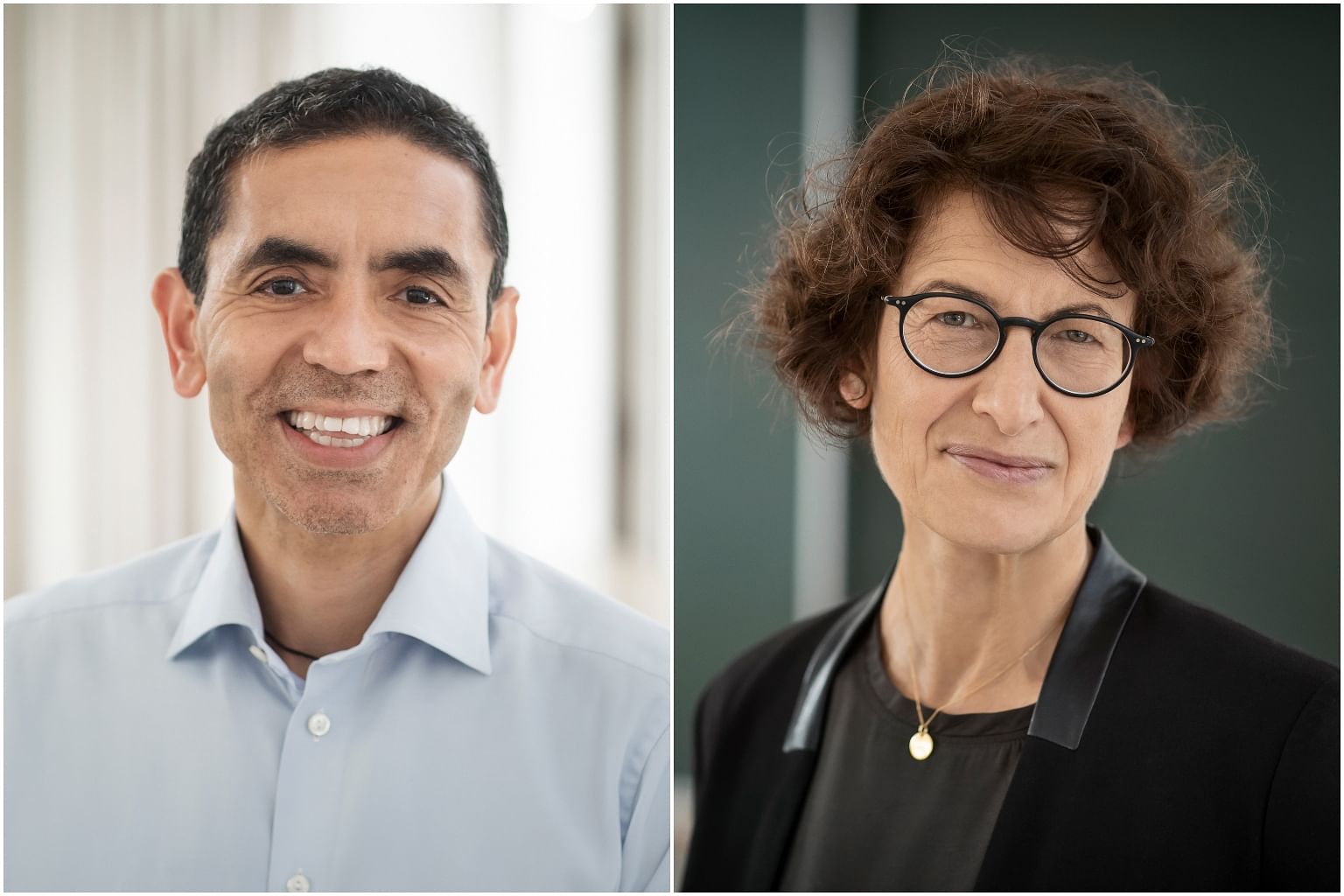Covid-19 vaccine: Couple's perfect meeting of minds and excellence behind BioNTech's success
Sign up now: Get ST's newsletters delivered to your inbox

Dr Ugur Sahin (left) and Dr Özlem Türeci are now known as the physicians fuelling Pfizer's success with its candidate for a Covid-19 vaccine.
PHOTOS: NYTIMES
Follow topic:
BERLIN - Two children of Turkish migrants, both medical students, meet in the 1990s in Germany and fall in love while balancing their work finding a cure for cancer.
Dr Ugur Sahin and Dr Özlem Türeci are now known as the physicians fuelling Pfizer's success with its candidate for a Covid-19 vaccine.
The pair, who are married to each other, had worked in the relatively new area - immunotherapy, which taps the body's own system to fight the disease.
The idea was so new, they could not get support from the medical industry.
In 2001, they set up Ganymed Pharmaceuticals and continued their work on cancer immunotherapies before selling the firm in 2016 for €1.4 billion (S$2.23 billion).
But even then, they persisted with their research on modified genetic code, or messenger RNA (mRNA), by setting up BioNTech.
They believed the modified mRNA could be used to trick the body into fighting cancer. It proved pivotal in designing a coronavirus vaccine.
The pact between the American pharmaceutical giant Pfizer and BioNTech has produced a two-shot vaccine candidate that reportedly had an efficacy rate of over 90 per cent in late-stage clinical trials.
Moved to Germany
Dr Türeci, the 53-year old chief medical officer of BioNTech, grew up in north-west Germany.
Her father, who was born in Istanbul, had worked as a surgeon in the small German town.
As for the 55-year-old Dr Sahin, he moved to Germany together with his father when he was four years old.
While his father worked in an automobile company, he dreamt of doing something that could change the world.
Even at a young age, Dr Sahin saw Nobel prize-winning German physician Paul Ehrlich as his role model.
The scientist had worked in the field of immunology and antimicrobial chemotherapy, and in 1909, found a cure for syphilis.
Dr Sahin's work followed a similar line.
The couple later learnt that by sequencing the tumour material, they could identify the neo-antigens the cancer produces.
With the right chemicals, they found that the immune system could be directed to attack the mutated antigens, a highly individualised form of cancer treatment.
"Each patient gets his own vaccine against his tumour," Dr Sahin had explained in an interview two years ago.
Based on their research and experience, the Turkish-German couple earlier this year decided to take on the coronavirus.
After 10 months, BioNTech developed with Pfizer the vaccine candidate - BNT162b2.
It was tested on 39,000 healthy individuals in clinical trials. Now the firms need to prove that the vaccine is safe.
Even before Pfizer's announcement early this week, the United States' Food and Drug Administration (FDA) as well as the European Medicines Agency (EMA) had two weeks ago looked into accelerating the licensing procedure for vaccine candidates.
BioNTech is hoping that the FDA will grant emergency authorisation in the third week of November, while the European Union's drug regulator is fast-tracking the approval process.
"It is very important for us to find a fair process to divide the vaccine. The pandemic is very present everywhere.
"We will try to provide the doses in the different regions," Dr Sahin said in an interview with the German daily Frankfurter Allgemeine Zeitung.
The US had secured in summer 100 million doses for almost US$2 billion ($2.7 billion), which would mean a single dose would cost US$20.
"The price will be based on the economic strength of the respective region," Dr Sahin said. "In addition, the order quantity will be decisive."
For full immunisation, two doses of the vaccine must be administered within 28 days of each other.
Emergency authorisation
The EU this week signed an agreement with Pfizer and BioNTech for the delivery of 300 million doses, which will allow 150 million people to be vaccinated.
In principle, all 27 members of the EU should have equal access to the vaccine, which will be distributed according to the size of the population of each country.
With a share of 19 per cent of all people living in the EU, Germany would be entitled to receive 57 million doses in the first tranche.
German Minister of Health Jens Spahn believes it would be difficult to communicate to the public if the country is not among the first to receive the vaccine.
Mr Spahn was alluding to the €375 million the German government spent funding BioNTech's research.
Since the news broke this week, reporters have been flocking to Mainz, a mid-size city located around 40km west of Frankfurt, to catch a glimpse of the couple.
Share prices of BioNTech had soared, propelling Dr Sahin, the firm's chief executive,to the top 100 wealthiest people in Germany.
The couple, however, seem to be taking the sudden attention in stride.
They continue cycling every morning from their apartment to work in Mainz, to their office with a very fitting address - An der Goldgrube 12.
Translated, it means "at the goldmine 12".

